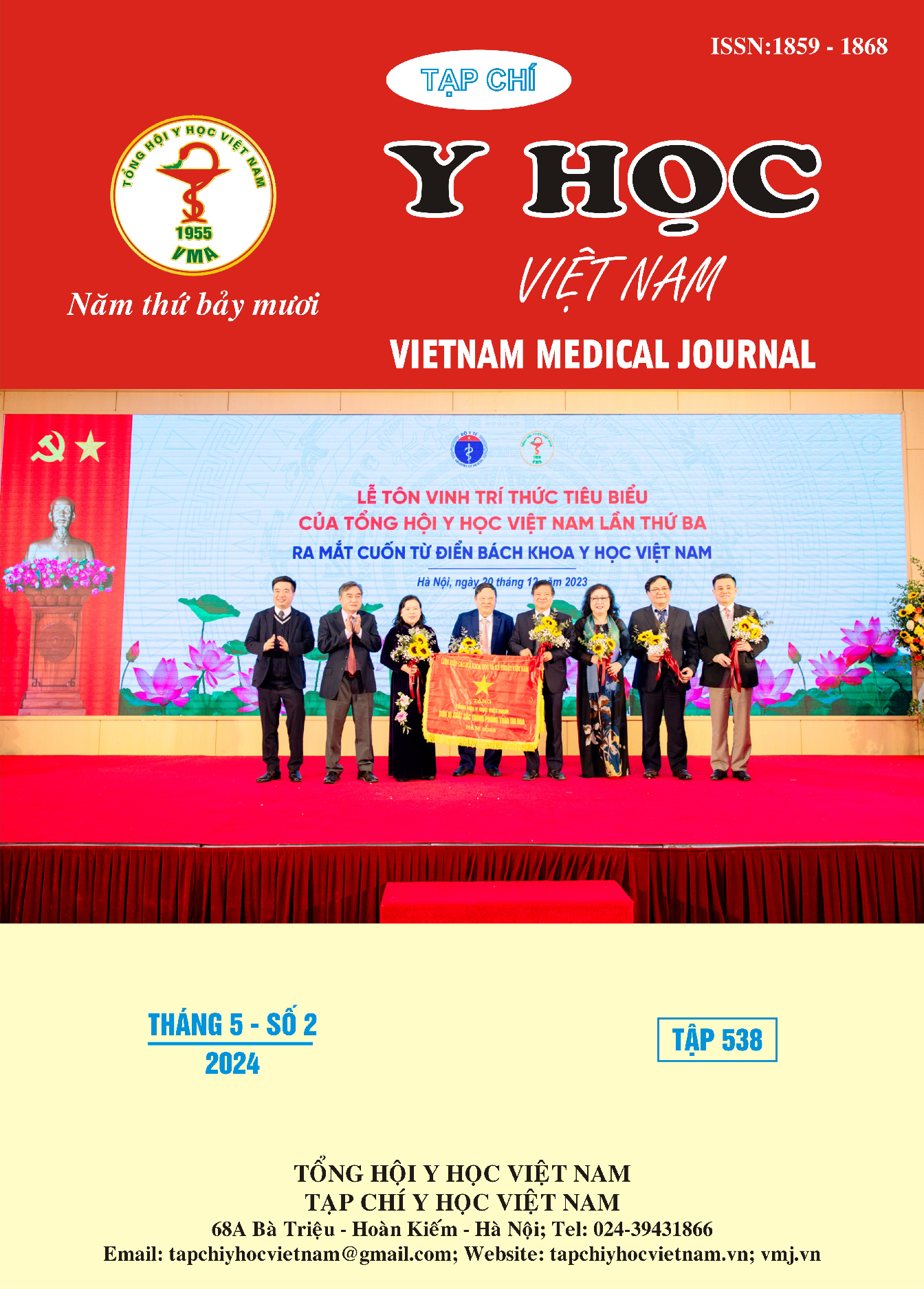A PILOT STUDY OF POLYMORPHIC VARIANT RS216321 AND SOME CHARACTERISTICS OF HEMORRHAGIC FOCI IN HUMANS WITH SPONTANEOUS INTRACRANIAL HEMORRHAGE
Main Article Content
Abstract
Background: Polymorphic variant rs216321 on the VWF gene helps predict hematoma expansion in cases of spontaneous intracranial hemorrhage (sICH). There is currently no data on this variant in Vietnam. Objective: initially determine the prevalence of this rs216321 variant in a population with ICH and characterize the presence of the variant according to some characteristics of the foci of haemorrhage. Subjects and methods: a case series study, convenient and prospective sampling, on 96 patients diagnosed with sICH, at Nguyen Tri Phuong hospital, from 10/2022 to 06/2023. The rs216321 variant was identified using the SYBR real-time PCR technique. Collect data on age, gender, location, number of hemorrhagic foci, diameter of hemorrhagic foci. Data was analyzed using STATA 14.2 software. Using the Chi squared and MannWhitney tests with a significant difference of p<0.05. Results: the proportion of risk alleles (T allele) accounted for 28%, the proportion of CC, CT and TT genotypes was 50.0%, 43.8% and 6.2%, respectively. When comparisons were made between the group without variants (genotype CC)(n=48) and the group with variants (genotypes CT and TT)(n=48), there was no difference in characteristics of age, gender, location of haemorrhage, number of foci of haemorrhage, and hematoma volume. Conclusions: The study provides preliminary data for evaluating the role of this variant in the potential spread of hematomas.
Article Details
Keywords
Spontaneous Intracerebral Hemorrhage (sICH), rs216321, vonWillerbrand Factor (VWF gene).
References
2. Guo H, You M, Wu J, et al. Genetics of spontaneous intracerebral hemorrhage: risk and outcome. Front Neurosci. 2022; 16:455.
3. Appelboom G, Piazza M, Han JE, et al. von Willebrand factor genetic variant associated with hematoma expansion after intracerebral hemorrhage. J Stroke Cerebrovasc Dis. 2013; 22(6): 713-7.doi: 10.1016/ j.jstrokecerebrovasdis. 2011.10.018.
4. Hemphill Iii JC, Greenberg SM, Anderson CS, et al. Guidelines for the management of spontaneous intracerebral hemorrhage: a guideline for healthcare professionals from the American Heart Association/American Stroke Association. Stroke. 2015; 46(7):2032-2060.
5. Phạm Phú Song Huy, Nguyễn Hưng Thịnh, Nguyễn Hoàng Tuyết Minh, Nguyễn Hữu Ngọc Tuấn (2024). Quy trình kỹ thuật real-time PCR SYBR chẩn đoán biến thể rs216321 trên gen VWF ở người bệnh xuất huyết nội sọ tự phát. Tạp chí Y học Việt Nam, 534(2): 309-313
6. Bộ Y tế. Quyết định số 5331/QĐ-BYT. Quyết định về việc ban hành hướng dẫn chẩn đoán và xử trí đột quỵ não. 2020: 23.
7. Elek Z, Losoncz E, Maricza K, et al. Missense Variants of von Willebrand Factor in the Background of COVID-19 Associated Coagulopathy. Genes (Basel). 2023; 14(3). 10.3390/genes14030617.
8. Vaidya D, Yanek LR, Herrera-Galeano JE, et al. A common variant in the Von Willebrand factor gene is associated with multiple functional consequences. American Journal of Hematology. 2010; 85(12):971.


